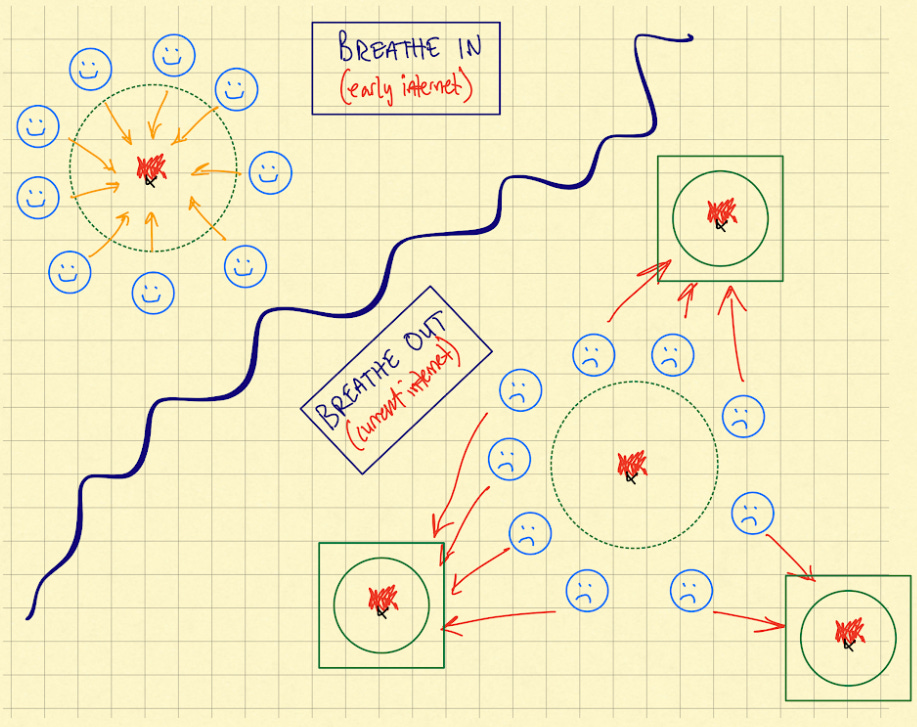The Respiration of Internet Culture
A theory of how the internet works
One of the best articles I read last year is this one from Vulture called “Podcasting Is Just Radio Now.” Here’s an excerpt from it:
These days, “no one is taking any creative risk,” said Laura Mayer, a veteran podcast executive and producer who’s worked at several large publishers. “We’re seeing plenty of efforts to reverse-engineer what were successes in podcasting, and as a result, we get a lot of watered-down karaoke attempts at what worked out in the past.”
A big part of what makes a medium an art form is the existence of internal trends and movements: Serial’s catalyzing a whole ecosystem of true-crime podcasts, Ira Glass’s inspiring a generation of narrative producers who write and sound a certain way. And what keeps an art form dynamic is constant organic reinvention — that is, a medium’s capacity to cultivate, ingest, and be transformed by new ideas that build on and interrogate what’s come before. Given the industry’s fixation on celebrity casts and habit of outsourcing its true-crime research to Wikipedia, it’s hard to contend that podcasting has done much reinvention of late.
The whole article is fascinating and worth reading if this kind of stuff interests you at all. The author talks to some podcasting juggernauts and makes some good points about where podcasting has been and where it may be headed.
I am just so endlessly interested in what I’ve called the “respiration” of the internet. This respiration manifests both in content trends, like what is highlighted in the article above, and in social trends like what I am about to explain below. Respiration is the best image I can conjure about what I mean. Close your eyes and imagine the act of respiration—there is a sort of inflation and deflation, a moving in and a moving out. I see this so clearly over the timeline of the life of social internet culture. I made a diagram. Let me explain.
First, we came together.
When the social internet really took hold, say around 1997-2008, we all sort of “came together” if you will, around the shared bonfire of the newfound social internet. This is the longest period of the three-stage social internet history I’m laying out here, mostly because it took so long for so many people to log onto the internet. We gathered online back when “online” felt like a place you went rather than a status you constantly maintained.
When we first gathered around the bonfire of the social internet, it was amazing wasn’t it? We connected around shared interests, mutual connections, and the like. There was this feeling of, “Wow! The internet is so cool. There are so many interesting people out there, and I can’t wait to meet all these new people!”
~~~Breathe in~~~
The early social internet wasn’t perfect by any means, but there was a sort of optimism about the social connection it provided.
Then, we got sick of each other.
The second age of the social internet is when things started to get a bit messier than they were before. From about 2008-2016, we started to realize that gathering around a bonfire with the rest of the world was maybe not as cool as it once seemed. We went from thinking, “Wow, all of these new people are so cool!” to, “Wow, all of these people are actually terrible!”
~~~Hold your breath~~~
I blame this change of tone on the seeping of politics into everything, particularly around the 2016 United States presidential election.
We went from happily gathering together with fellow birdwatchers, watercolor painters, and chess aficionados to analyzing the political opinions of all of these newfound connections and deciding whether or not these other people were worth our attention based on their political views.
It is jarring to meet a bunch of new birdwatcher friends, form Facebook groups and subreddits with them, and then ultimately be disgusted by them because you’ve decided that they are actually fascist pigs.
We came together. We were amazed. Breathe in
Then the shine wore off and we were disgusted. Hold your breath
Then we began to slide into our own communities, with our own bonfires. Breathe out.
Now, we’re building our own bonfires.
I think the peak of the public social internet has passed. I think it was in 2016. Now, because so many of us became so disgusted with each other, we’ve begun to retreat from public places of meeting to our own private spaces, building community with people around shared interests like before, but in more guarded ways.
~~~Breathe out~~~~
We’ve built our own private bonfires and we are being more selective about who we let hang out around them. We’re retreating to Discord servers, group chats, and other more exclusive communities.
Think about movements that have splintered. Think about massive groups that came together around the inhale of the social internet and have begun to fracture amid the exhale. For Christians: think of The Gospel Coalition, or shoot, evangelicalism as a whole for that matter.
Internet culture is living and breathing. In some sense, that image is more literal than it first appears.




This theory is spot on. Since respiration is a cycle, though, I wonder: after people have collectively exhaled long enough, do you think people will get tired of their private bonfires and Discord servers and decide that it's time to inhale again? Does each subsequent generation need to inhale, hold their breath, and exhale, or does everyone come into the social Internet now already exhaling?
(I doubt it, and I go back and forth on whether the proliferation of private bonfires is the lesser evil between everyone being forced together and disgusted with each other.)